“Homecoming” is a short story by American writer Ray Bradbury, first published in 1946. A family of ghouls hosts a big family reunion for Allhallows Eve. Dead relatives return for the occasion. Unfortunately for Timothy, he seems to be the only member of the family who doesn’t have supernatural powers.
Some readers pick this up expecting a chilling thriller. This is not that. It’s got the same chill factor as The Munsters, without the gags. Illustrations such as the one below suggest a scarier tale:
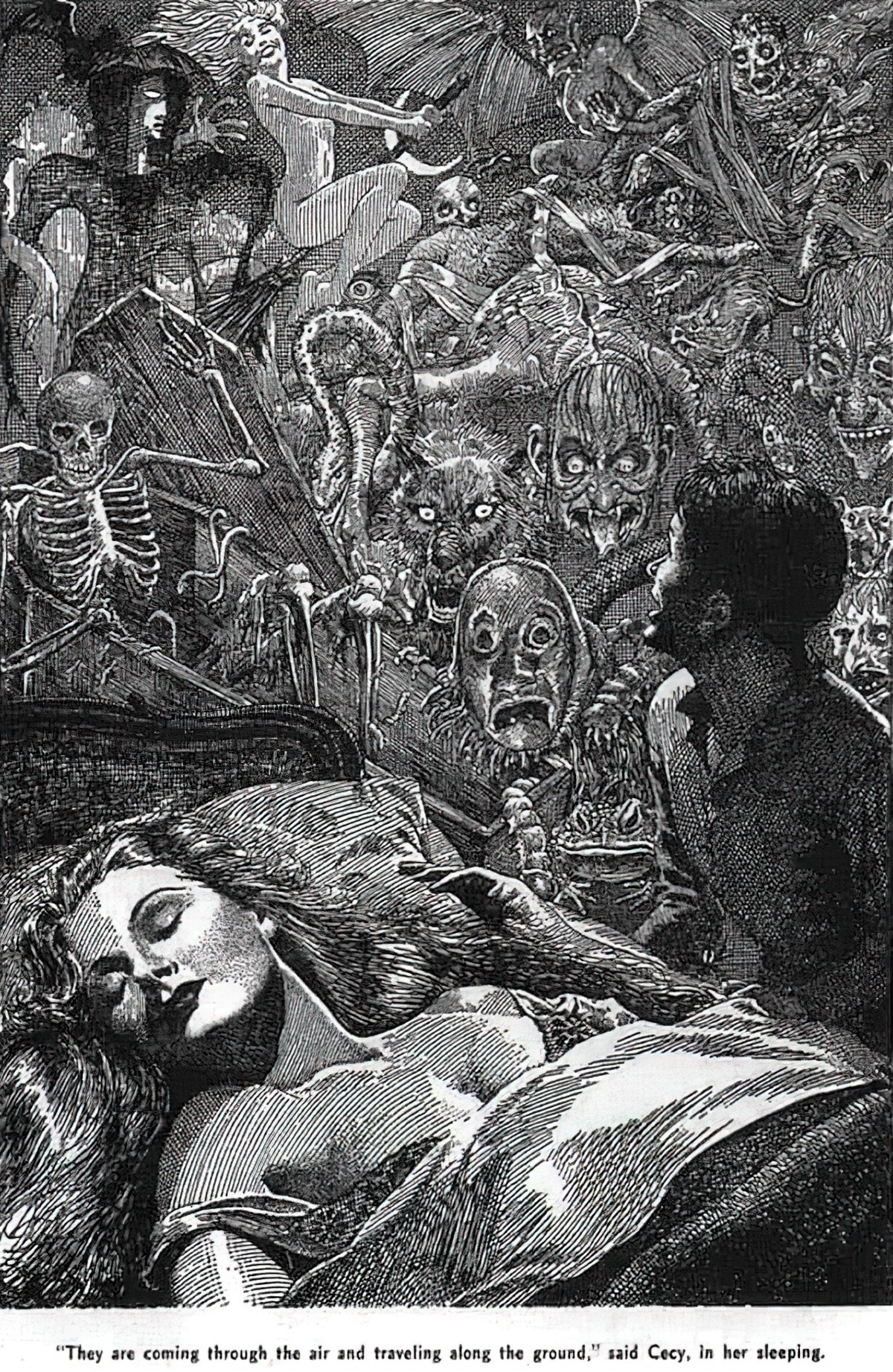
Lawrence Stern Stevens’ illustration reminds me of this one, from 1874:
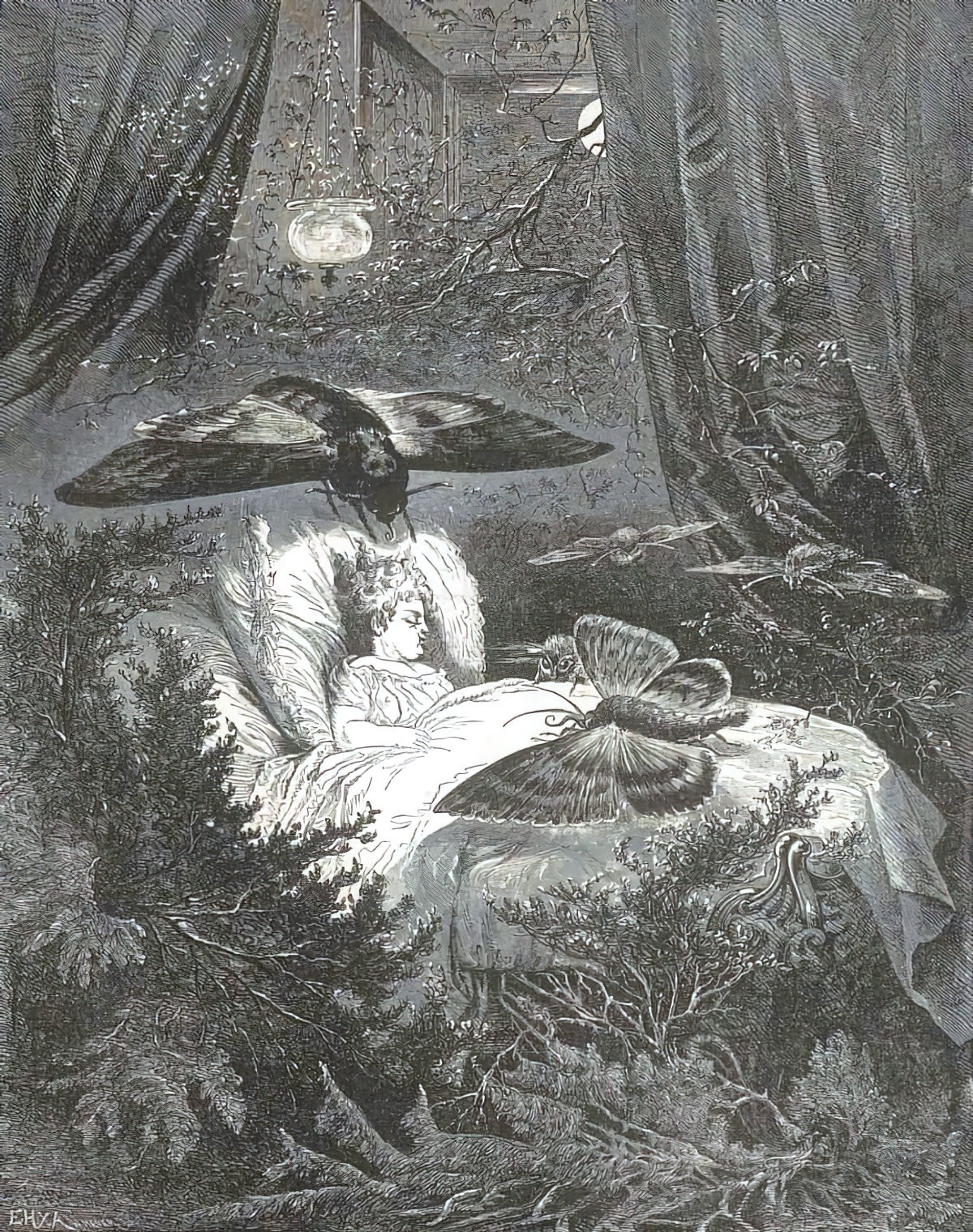
Also this one, by John Anster Fitzgerald:
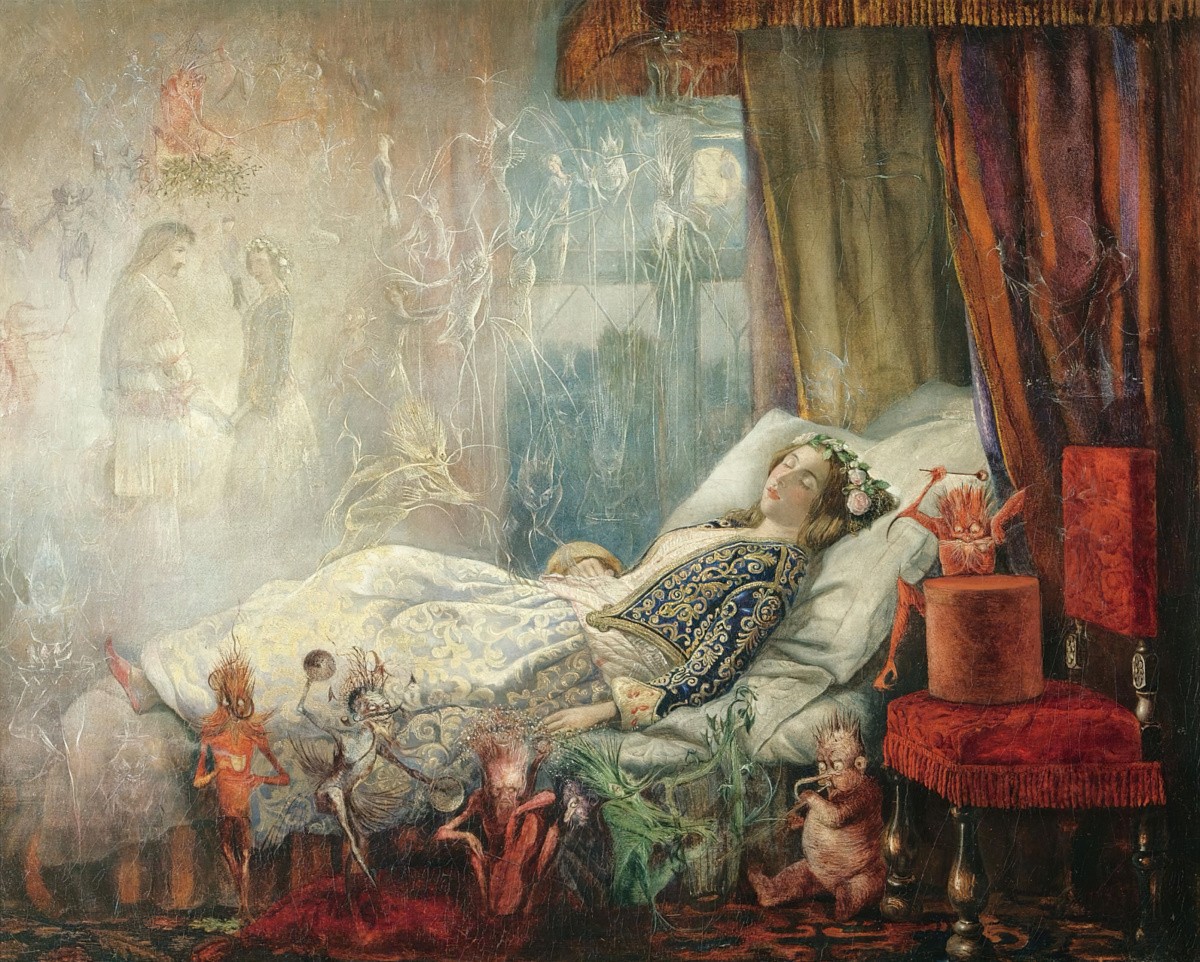
I wonder if Ray Bradbury was at all influenced by this genre of artwork when conceiving the opening to “Homecoming”.
DISCUSSION QUESTIONS FOR “HOMECOMING”
- Describe the house where this story is set. What are they preparing for?
- What does the landscape look like outside this house?
- What is Cecy’s superpower?
- In what specific ways is Timothy different from his siblings?
- Ray Bradbury avoids labelling the supernatural family members but he does draw from folklore. What sorts of creatures do you imagine?
- What do you think about Cecy’s actions towards Timothy at the party? What did she mean to do, and is it okay the way she did it?
- Timothy ostensibly cries ‘happily’ because of the joy at seeing his favourite uncle. Could there be more to his overwhelm?
- Cecy uses her own superpower to let her brother Timothy see through the eyes of other men. Why is she doing this for him?
- Do you think Timothy’s uncle understands him? his mother?
- What do you think happens to Timothy after the story ends?
PARATEXT
THE TITLE
This is a double-layered title:
- The extended relatives and ancestors return home to celebrate
- A teenage boy realises something about himself and feels he has spiritually/emotionally ‘come home’
Sometimes stories which are not written by and for a queer audience by a queer audience achieve queer resonance regardless. “Homecoming” by Ray Bradbury is one excellent example of this phenomenon.
Queer communities frequently talk about the experience of ‘coming home’, which describes that moment of finding your people/person after a lifetime of feeling wrong. For allosexual queers, it might describe the moment of union with someone you’re actually attracted to. Now you know what everyone’s talking about. That’s ‘homecoming’.
There’s a 2006 picture book edition of “Homecoming” illustrated by Dave McKean (who also illustrated Neil Gaiman’s Wolves In The Walls.)
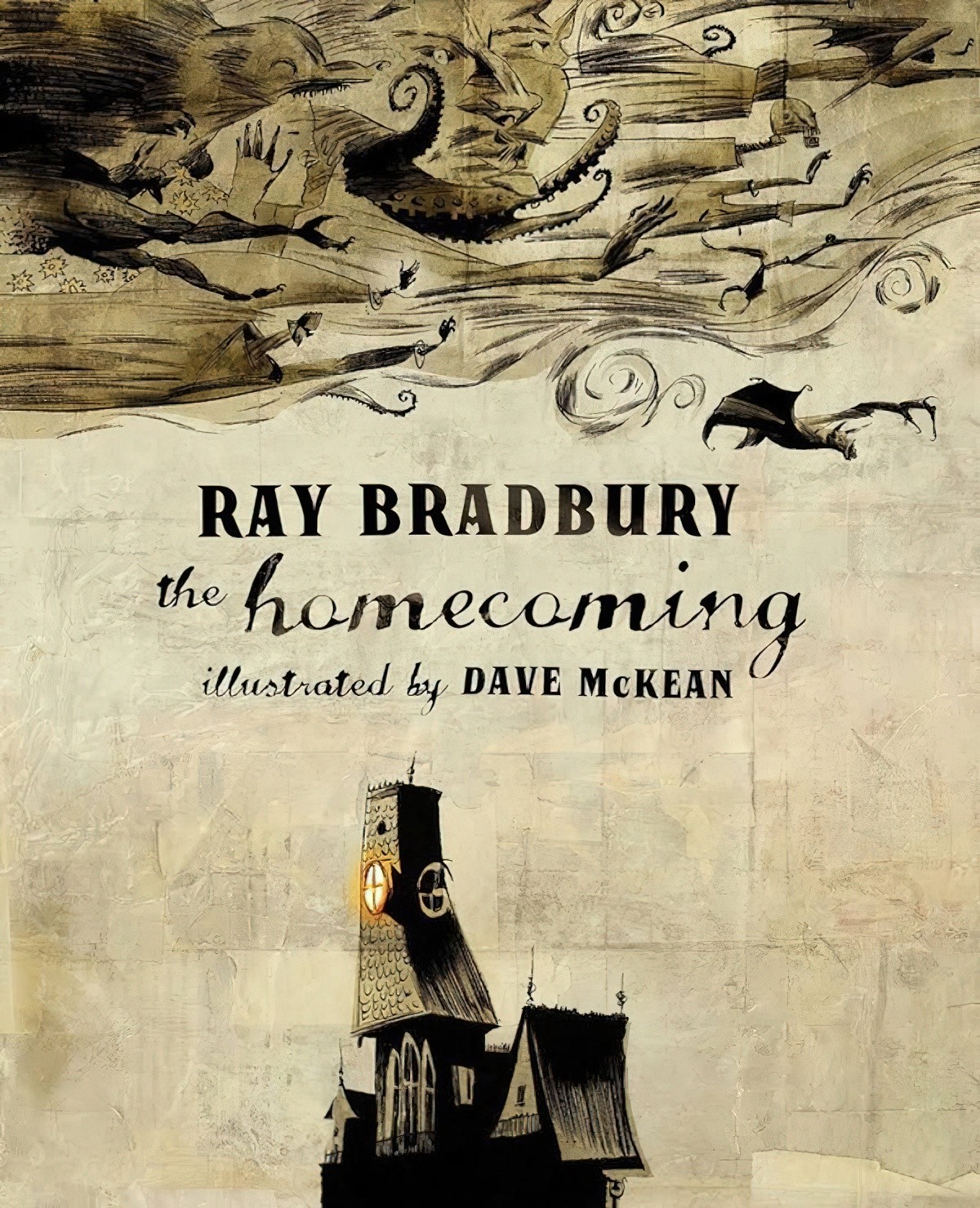
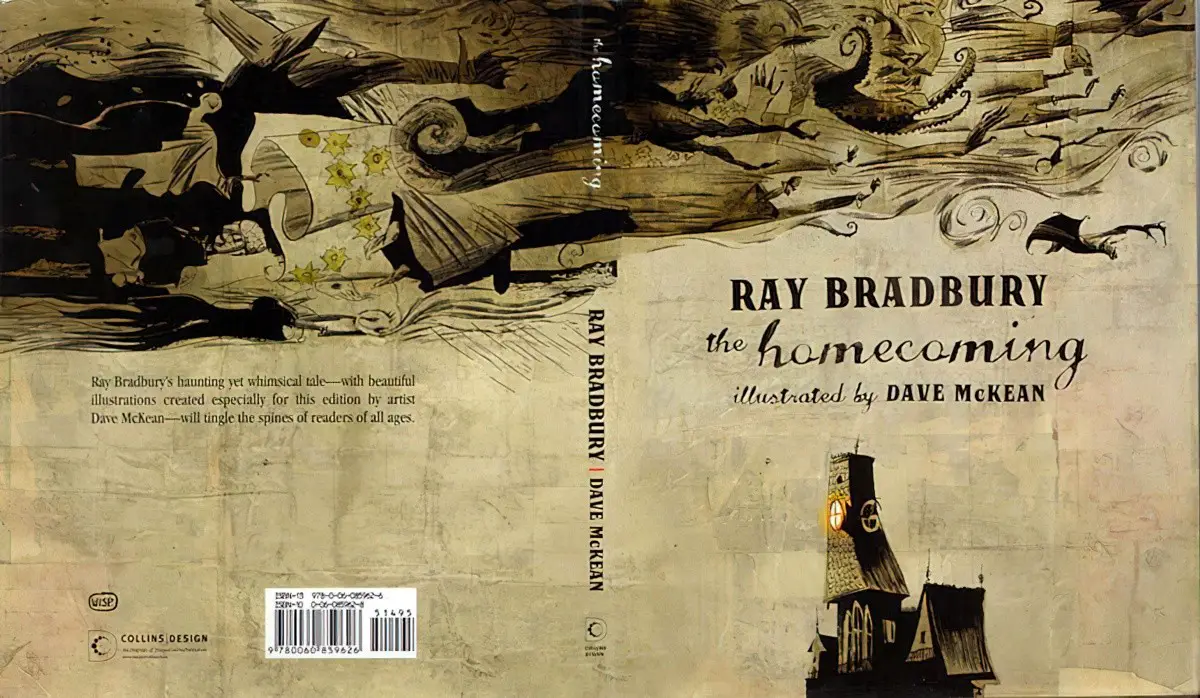
SETTING OF “HOMECOMING”
This story belongs to the era of The Munsters and The Addams Family — bustling American families of supernatural outsiders who are nonetheless allo-cis-hetero-normative (if not outright hostile to the queer community).
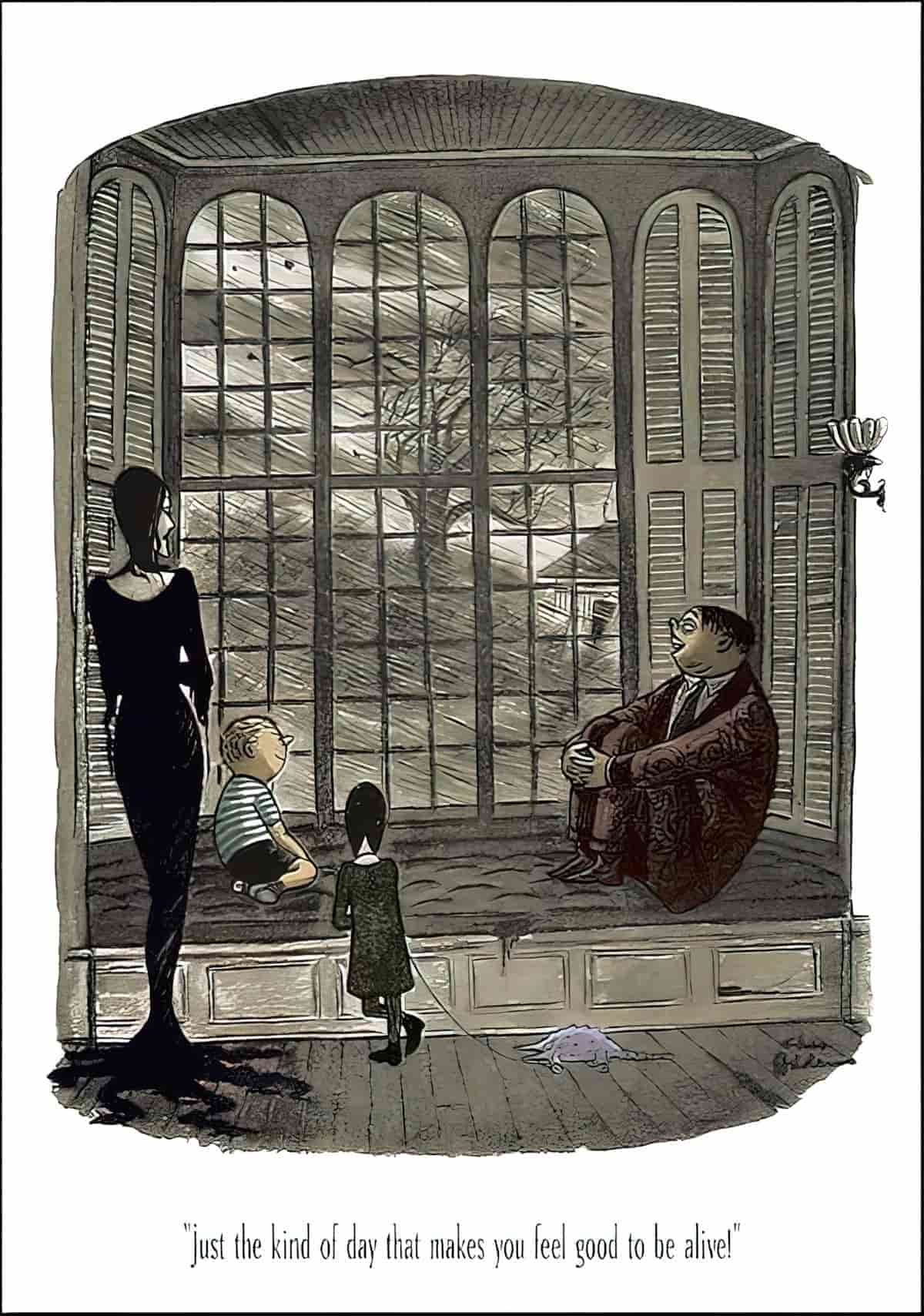
PERIOD
1940s, Halloween week.
Christians celebrate Christmas differently from non-Christians (who commonly consider it a time for family, presents, drinking and food). Likewise, this family of actual ghouls takes All Hallows far more seriously than the rest of us (who consider Halloween an opportunity to connect with neighbours and eat candy).
DURATION
Two days
LOCATION
In a Gothic mansion, somewhat removed from the nearest town. Although this is probably set in Bradbury’s time, the house is from an earlier century. This family still uses tallow candles (candles made of fat). An unusual choice for home lighting: As soon as poor people could afford wax candles everyone switched to wax, as wax burns cleaner and doesn’t stink. Of course, to burn an actual body part is far more creepy, and we can assume Timothy’s family actively enjoy the smell of burning fat!
Bradbury suggests the family doesn’t always live like this. They may live typical American lives, except for the week of Halloween, in which they resuscitate the rituals of their ancestors:
This past week the whole family had lived in the fashion of the old country.
“Homecoming”
If you’ve read “Uncle Einar”, the companion story, you’ll know this house is situated in (fictional) Mellin Town, Illinois.
ARENA
The story takes place inside the house and yard, though clairvoyant Cecy can see what’s happening beyond this small arena.
WEATHER
Importantly for a North American audience, the autumn seasonality shines through. Halloween requires cool weather, wind, brown leaves.
And the wind began…As Timothy leaned out, a flesh-and-blood gargoyle, the vast armada of tomb dust and web and wing and October leaf and graveyard blossom pelted the roofs even as on the land around the hill shadows trotted the roads and threaded the forests armed with teeth and velvet paws and flickered ears, barking to the moon.
“Homecoming”
TECHNOLOGY CRUCIAL TO THIS PARTICULAR STORY
This is a supernatural story with links to an ancient, fairytale world. There’s mention of a stairwell, which is shortened to ‘well’ in this story. Wells are dark, terrible, dangerous, necessary things. Timothy jumps off it (and is caught by his massive uncle).
Bradbury never makes explicit the exact nature of these supernatural creatures. (I’m collectively calling them ghouls.) At times I wondered if they’re all vampires, but I think it’s more like Pixar’s The Incredibles. Everyone gets their own superpower.
This is an animistic world. Some of the ancestors come to celebrate Allhallow’s Eve in the form of autumn leaves.
NATURAL SPACES
Although Timothy is limited to the arena of the house, Cecy’s clairvoyance paints a wider world in which the house is surrounded by forest, river, waterfall. Wolves (or ‘wolflike things’) inhabit the forest.
There is much natural space between Timothy’s Gothic mansion and the nearest civilisation, which tugs on Timothy, as a regular human. The space between himself and the town feels insurmountable at this point:
He climbed a hill and looked at the town, miles away, settling into sleep, the town-hall clock, high and round, white in the distance. The town did not know, either.
“Homecoming”
LEVEL OF CONFLICT
A boy does not fit in with his family, though he tries his best to blend.
STORY STRUCTURE OF “HOMECOMING”
SHORTCOMING
As the only member of the family without supernatural powers, fourteen-year-old Timothy, with his ‘little grey eyes’ makes for a natural viewpoint character. Like readers, he is an outsider, even in his own home.
Oh, to have strong teeth, with incisors like steel spikes. Or strong hands, even, or a strong mind. Even to have the power to send one’s mind out, free, as Cecy did. But, no, he was the imperfect one, the sick one. He was even–he shivered and drew the candle flame closer–afraid of the dark. His brothers snorted at him. Bion and Leonard and Sam. They laughed at him because he slept in a bed.
“Homecoming”
Timothy’s family consider him ‘ill’. This illness (mortality plus a lack of supernatural ability) is also his superpower. For instance, he is able to look into a mirror*.
*The mirror detail indicates Bradbury is borrowing heavily from vampire lore. Vampires are said to be afraid of mirrors because mirrors are thought to contain a layer of silver, and silver is the only ‘pure’ metal (in contrast to the impurity of the vampire, who has no soul). For this reason, too, a vampire has no reflection in a mirror.
He also gets his own room. (His brothers sleep in coffins.) Timothy will die one day, and will be sleeping in a coffin for a very long time. He doesn’t need to sleep in one while he’s alive.
DESIRE
Timothy longs for something he can’t have, and which he may never have, despite reassurances from his family that he’d be better off without it.
At the deepest level of meaning, most people can probably relate to this feeling, even if it’s as simple as wanting a model aeroplane for Christmas and not getting one.
I think of Timothy as an allegory for a contemporary gay boy who isn’t entirely sure about his sexuality yet. He’s still working it out. His brothers hassle him about it, because it’s evident to them that he’s different. He’s drawn to his sisters, Cecy, Laura and Ellen, but they don’t accept him as one of their own, either. His uncle barely knows him, but when he visits for a family occasion he tests him out. In this story the uncle tests Timothy’s inability to fly, which could be allegory for a young man’s inability to perform hegemonic masculinity.
After subtle rejection from his favourite uncle, Timothy wants to do something at the party to make everyone notice him.
OPPONENT
Timothy’s family, who are all different from himself. They are all immortal, and all have superpowers.
It’s heartbreaking that childhood Timothy clearly had a wonderful relationship with his Uncle Einar. Now he has reached an age where he is supposed to morph into someone different, the relationship has become strained. Unable to truly fly, Uncle Einar shouts, “Enough!” and ‘deposits him on the floor timbers’.
PLAN
Timothy carries around a ‘pet’ spider which gives rise to one of the most disgusting few sentences I’ve ever read in a short story. (The part where the spider gets into his ear.) This spider may be Timothy’s attempt to emulate supernaturality.
He asks Cecy for help in carrying out his plan to do something remarkable and noteworthy. Cecy hands him a goblet of red liquid (blood?), which on Timothy has an alcoholic effect. Then he nips Laura in the neck. He eats toadstools, which have a psychedelic effect.
THE BIG STRUGGLE
When the spider climbs into Timothy’s ear and makes Timothy really uncomfortable, we might read this as a sign that spiders aren’t really Timothy’s thing. He’s trying to make spiders his thing. They’re just not.
Drunk and high, Timothy now feels he can fly for real. He only makes a fool of himself. Timothy is now angry with Cecy for setting him up to look stupid.
ANAGNORISIS
Timothy’s mother reassures him that even if he’s different, he’ll still be okay.
In the world of the story, the mother saying she will visit his bones and tend his grave is cold comfort because Timothy will still die. This is hard for all of us to live with, but imagine how much harder it would be if none of your family would die, just you. It would feel like an illness, right?
In the realm of queer allegory, it is one thing for a mother to tell her son she’ll accept him and look after him when he is ostracised by his brothers and male relatives and constantly feels different.
Uncle Einar does his best to reassure his nephew using words:
“Don’t feel badly, Nephew Timothy. Each to his own, each in his own way. How much better things are for you. How rich. The world’s dead for us. We’ve seen so much of it, believe me. Life’s best to those who live the least of it. It’s worth more per ounce, Timothy, remember that.”
“Homecoming”
Earlier in the story, she has said, “He’ll learn, he’ll learn” (to like blood — to like girls). This does not signal acceptance.
“Son,” she said, “we love you. Remember that. We all love you. No matter how different you are, no matter if you leave us one day.” She kissed him on the cheek. “And if and when you die, your bones will lie undisturbed, we’ll see to that. You’ll lie at ease forever, and I’ll come visit every Allhallows Eve and tuck you in the more secure.”
“Homecoming”
Mother’s words ring hollow because at the age of fourteen his whole life stretches before him yet.
Acceptance does not equal understanding. Ray Bradbury also explores this theme in “The Man Upstairs“. Also, acceptance means nothing when it’s predicated upon a version of yourself imagined by people who purport to love you. It’s not you that they love, but an invented version of you.
NEW SITUATION
Cecy uses her own superpower to let her brother Timothy see through the eyes of other men. Why is she doing this for him? Is this part of her making amends? After getting her brother drunk, she has already revealed herself to be a prankster.
For the story, this is a useful plot point because Timothy is working out his own way of existing in the world by trying to imagine what it’s like to be one of these other men before him. Can he see himself as one of these men? What about through? It seems to me Cecy knows her brother well, and is wanting to hasten his self-revelation. She’s doing this via nefarious means. Timothy did not consent to her getting him drunk. He doesn’t consent to her invading his mind.
There’s much to be explored in a post #metoo era regards supernatural stories. In this story, Timothy thanks his sister for the insight.
By the time his mother talks to him, he already knows for sure he is different. When his mother gives him permission to leave, she is instructing him to leave.
EXTRAPOLATED ENDING
Would he be there? [At the 1970 Salem Family Gathering?] Could he be certain of staying alive until then?
“Homecoming”
Bradbury gave us enough clues to work it out: Timothy won’t be sticking around in this house where no one understands or accepts him. He can see the town in the distance, full of regular people, and I would anticipate he goes there.
COMPARE AND CONTRAST
Though not at all similar on the surface, Katherine Mansfield also wrote of a party, also with a character named Laura. (“The Garden Party“.) Aside from a party setting and a crossover character name, can you find other, deeper similarities?
